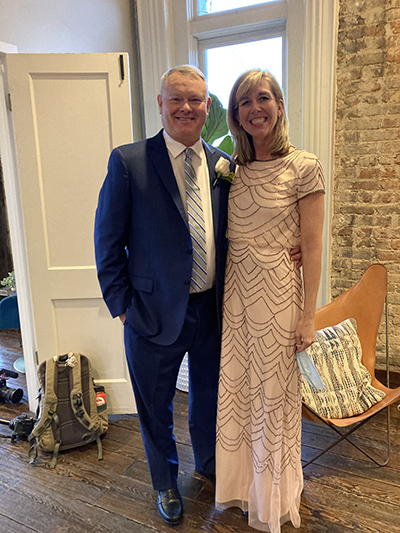Media contact: Adam Pope
 When faced with anorectal melanoma, an uncommon and aggressive form of cancer, Meredith McGowan turned to the University of Alabama at Birmingham for cross-specialty, cutting-edge treatment in order to get back to her active lifestyle.
When faced with anorectal melanoma, an uncommon and aggressive form of cancer, Meredith McGowan turned to the University of Alabama at Birmingham for cross-specialty, cutting-edge treatment in order to get back to her active lifestyle.
McGowan’s first stop was with medical oncologist Robert Conry, M.D., and UAB radiation oncologist Michael Dobelbower, M.D., Ph.D., who provided her with personalized, targeted cancer care through immunotherapy and radiation. Both treatments helped control the cancer, and McGowan had an excellent response.
“We knew that Mrs. McGowan’s case was a unique one that would require teamwork from specialists all across UAB,” said Division of Surgical Oncology Professor Thomas Wang, M.D., Ph.D. “Thankfully, our interconnected care and communication throughout the institution allowed us to treat Mrs. McGowan as a team of doctors, united behind her healing and recovery.”
Only after McGowan completed concurrent preoperative radiation therapy and immunotherapy and showed a terrific response to this treatment regimen were providers convinced that surgical resection of her tumor was the next best approach for a potential cure. So, following radiation, she met with Division of Gastrointestinal Surgery Associate Professor and Director of Health Services Research Daniel Chu, M.D.
Chu and the cancer team recommended that McGowan undergo an abdominal perineal resection surgery. APR surgery is used to treat anal and low-lying rectal cancers as surgeons remove the lower part of the patients’ colon, rectum and anus. This surgery used to be done through big open incisions with long recovery times, but now can be done minimally invasive with small incisions.
“Mrs. McGowan’s cancer was aggressive, so we had to treat it as such in order to pave the road to recovery for her,” Chu said. “We wanted to provide Mrs. McGowan with the best oncologic and cosmetic outcome, and that included a robotically assisted APR surgery followed by a robotically assisted muscle flap reconstruction of her pelvic floor, led by Dr. Patcha.”
The robotically assisted APR surgery is unique in that the procedure can be performed without leaving any incisions larger than the size of a quarter on a patient’s abdomen, not including the colostomy incision. When completed with his portion of the surgery, Chu passed the torch to Division of Plastic Surgery Assistant Professor Prasanth Patcha, M.D., M.Eng., to lead the prophylactic flap reconstruction portion of McGowan’s surgery. She was the first patient at UAB to undergo an APR and plastic surgery reconstruction that were both performed robotically, in order to treat her anorectal cancer.
Patcha performed McGowan’s muscle flap reconstruction of the pelvic floor completely robotically, which meant she was, again, left with small incisions during a procedure that has previously required very long midline incisions on the abdomen to retrieve the healthy muscle. Historically, recovery is about seven days in the hospital; but with these minimally invasive techniques and under the UAB Enhanced Recovery Program, McGowan was ready to be discharged in four days.
Muscle flap reconstruction of the pelvic floor has to be performed meticulously to avoid any breakdown of the wound, as there is a 30-50 percent chance of the wound’s re-opening. Patcha performed the reconstruction by using healthy muscles, not affected by radiation, to bolster the radiated areas in the pelvis. One of the best parts about the surgery for McGowan was the lack of scars and pain she felt after the surgery, as well as a shortened hospital stay.
“My pain level following the surgery was extremely manageable,” McGowan said. “I am so thankful to the UAB Surgery and cancer team for partnering together to give me the best care possible during this uncharted time. Cancer is a scary word; but UAB was with me every step of the way, and I look forward to getting back to my running soon.”
According to Patcha, it is increasingly unusual for plastic surgeons to be comfortable performing laparoscopic or robotic surgery due to evolving training curriculums. This might be why this procedure can only be performed in an exceedingly small number of institutions, which now includes UAB.
In Patcha’s case, he was fully trained in general surgery, with robotic training included, while he was in residency at Downstate Medical Center and Kings County Hospital Center. He is board-certified in general surgery as well as plastic surgery and hopes to apply these minimally invasive robotic reconstruction techniques to other reconstruction surgeries for various parts of the body such as limb salvage or craniofacial reconstruction.
“To go through an APR surgery as well as a pelvic floor reconstruction with absolutely no large scars or incision marks to show from it is the cutting edge of surgery,” Patcha said. “We are witnessing surgical history as we work to continue to perfect the art of reconstruction, lowering pain and recovery times for our patients.”
The team has since performed four robotic APR-pelvic floor reconstructions for patients diagnosed with anal or rectal cancers. If you or a loved one was recently diagnosed with anal, rectal or colon cancer and would like to learn more about your options for care, please visit uabmedicine.org or call 800-UAB-8816 to make an appointment with a specialist.